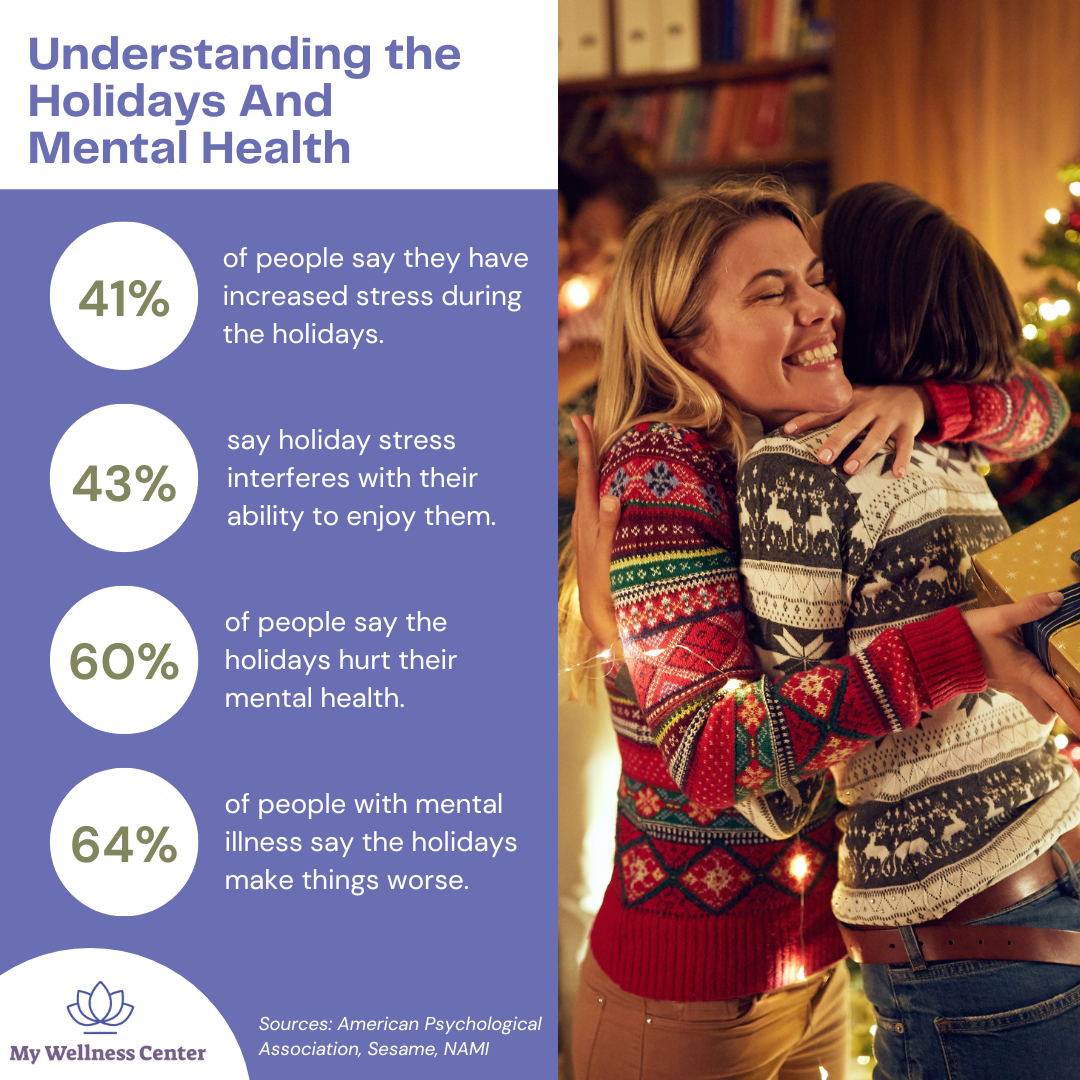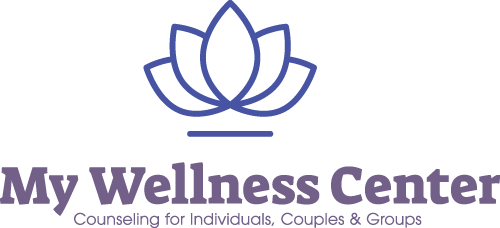The holidays are supposed to be a time to celebrate, but every year we receive a deluge of phone calls right after dinner time on Thanksgiving and Christmas, all from people in search of a therapist.
Unfortunately, the holidays are also a hotbed for mental illness. If there’s any sort of underlying trauma, depression, or familial conflict, the holidays are a time when these problems will boil to the surface and become incredibly problematic.
That’s why understanding the holidays and mental health is so important. It’s not just about overcoming “the holiday blues”; it’s about healing from trauma and experiencing long-term growth.
Understanding Holidays And Mental Health
If you’re feeling heightened stress levels around the holidays, you’re far from alone.

People everywhere are feeling the struggle. In fact:
- 41% of people say they feel increased stress during the holidays. (Source: American Psychological Association)
- 43% of people say the stress of holidays interferes with their ability to enjoy them. (Source: American Psychological Association)
- 60% of people say their mental health is negatively impacted by the holidays. (Source: Sesame)
- 64% of people with mental illness say the holidays make their condition worse. (Source: NAMI)
With all of that in mind, here are some important reminders to help you face the holiday season with a brave face:
- Talk to your therapist beforehand to develop a gameplan.
- Avoid alcohol. It might seem like it’s taking the edge off, but it can create more problems.
- Remember that it’s OK to put yourself first, especially when it comes to your physical, mental, and emotional health.
Resource List
How to Address Holiday Anxiety
How to Not Invite Family Members (And Avoid Conflict)
How to Handle Grief During the Holidays
How to Manage PTSD During the Holidays
How to Manage Loneliness During the Holidays
How to Address Holiday Anxiety
With so much social interaction—especially with unfamiliar family members or people you don’t necessarily get along with—the holidays can quickly become anxiety-inducing.
As we’ll see in a moment, simply not inviting problematic individuals can be helpful.
But other useful tips include:
1. Have A Safe Word – If you attend a party with a close family member, partner, or friend, have an agreed-upon safe word for when it’s time to go. If you get uncomfortable, simply use the safe word, and leave as soon as possible.
2. Focus On Grounding – There’s a popular grounding technique for managing anxiety. Sometimes called the “5-4-3-2-1 Technique,” it requires you to:
- Find your natural breath through slow, deep breaths.
- Find five things you can see.
- Find four things you can touch.
- Find three things you can hear.
- Find two things you can smell.
- Find one thing you can taste.
There are many other grounding activities you can use, so talk to your therapist for additional ideas!
3. Talk A Walk – Physically removing yourself from the stressful situation can give you space and clarity to recompose yourself and feel like yourself again.
How to Not Invite Family Members (And Avoid Conflict)
Some family members are destructive. No matter what, they always seem to drink too much or succumb to drug use—then make an uncomfortable scene for everyone nearby.
It’s OK not to invite them to your next holiday dinner.
If they find out about it and confront you about, commit to not becoming defensive. Instead, focus on the facts:
“Based on [events from the past], we don’t believe your behavior would be conducive to a family environment. When you feel ready to join us for a happy celebration, we’d love to have you back. And when you’re ready to take a step in the right direction—to heal—I’m here for you.”
How to Handle Grief During the Holidays
We commonly meet with patients who struggle with grief around the holidays. It makes sense, too: The holidays are a time for togetherness, but when you look across the table and don’t see the person you love, it hurts.
Unfortunately, there’s no quick fix for grief. But there are ways to make it a little more bearable:
- Honor their lives. If you’re missing someone who’s passed away, visit their grave site, hold their ashes, or even simply write a letter to them about all the things you wish you could say.
- Connect with your community. If you’re feeling grief, it’s likely a mutual friend or family member is also hurting. Talk to them and share your grief to lend support to one another.
- Share positive memories. Share your favorite stories about your loved ones. While the conversation may wander, keep it focused on the positive moments—and resist falling into stories that may draw up feelings of anger or resentment.
How to Manage PTSD During the Holidays
If you have a history of dealing with PTSD, the holidays can pose a variety of triggers. People, sights, and even smells can trigger PTSD.
This is especially true if you’re a survivor of child abuse or sexual abuse, as these are often committed by family members or someone you’re close to—and the holidays may push you back into the same room again.
If you feel any sort of anxiety, panic, and stress coming on, work to ground yourself. The 5-4-3-2-1 Technique we mentioned earlier can be incredibly helpful, but so can things as small as:
- Wiggling your toes.
- Using soothing lotions or oils, especially peppermint.
- Rubbing your middle fingers together, especially with oil or lotion.
Remember: It’s always OK to leave and focus on yourself. If you’re uncomfortable, remove yourself from the situation.
How to Manage Loneliness During the Holidays
Left unchecked, loneliness can lead into a spiral of self-loathing and self-destruction. Some strategies for overcoming loneliness during the holidays:
- Go on vacation. This is especially helpful if you’re planning on spending the bulk of the holidays by yourself. Get out of town and into a new environment. The constant distraction will make you feel less lonely, and you’ll even have a chance to connect with the new people you’ll meet along the way.
- Look for community events. Look around your community for public events to attend, like church-hosted spaghetti dinners for fire hall pancake breakfasts. These can help you spend the holidays surrounded by friendly faces and potential new friends.
- Volunteer. The holidays are the perfect time to give back to the community, and your volunteer work will connect you with people in need and fellow volunteers.
- Host a friendsgiving. Even if you don’t have family around, you could invite some friends and neighbors over for a lowkey holiday celebration.
Find Support In the Holidays: Use My Wellness Center
Don’t face the holidays and mental health alone. Contact us! Our team is standing by to give you the support you need.

